Guitar Tuners Guide
Accuracy
Accurate tuners ensure that your instrument is tuned to the correct pitch, resulting in optimal sound quality. Some tuners on the market offer impressive accuracy levels, such as the 'TC Electronic Polytune 3' with its groundbreaking ±0.1 cent accuracy. Other contenders include the 'Boss TU-3' with its highly precise ±1 cent accuracy, 'Korg Pitchblack Advance' with ±0.1 cent accuracy, and the 'Peterson StroboPlus HD' boasting ±0.1 cent accuracy as well. These tuners have built-in advanced technology that guarantees precise and reliable tuning, allowing you to achieve perfect pitch on your guitar effortlessly.
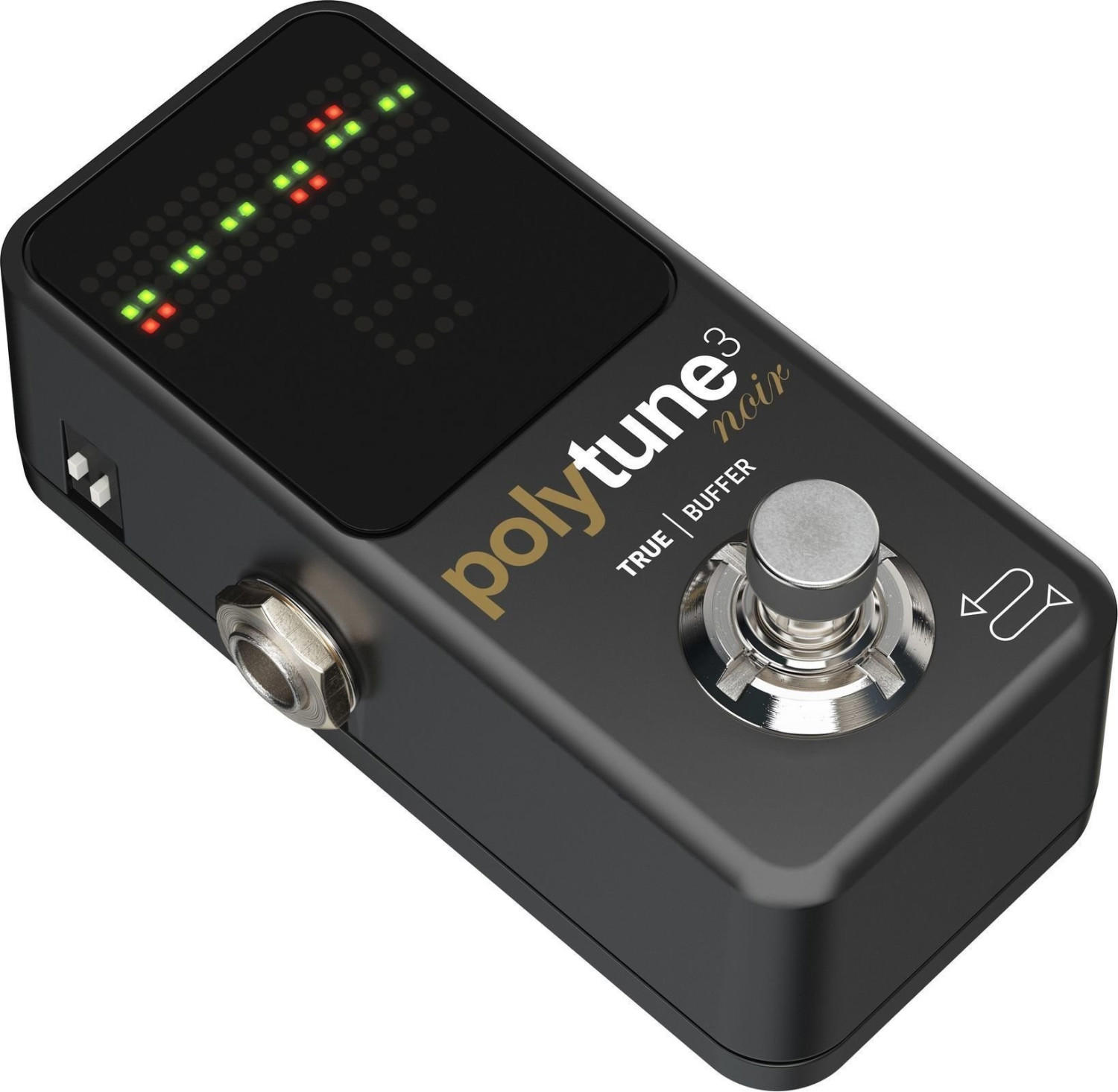
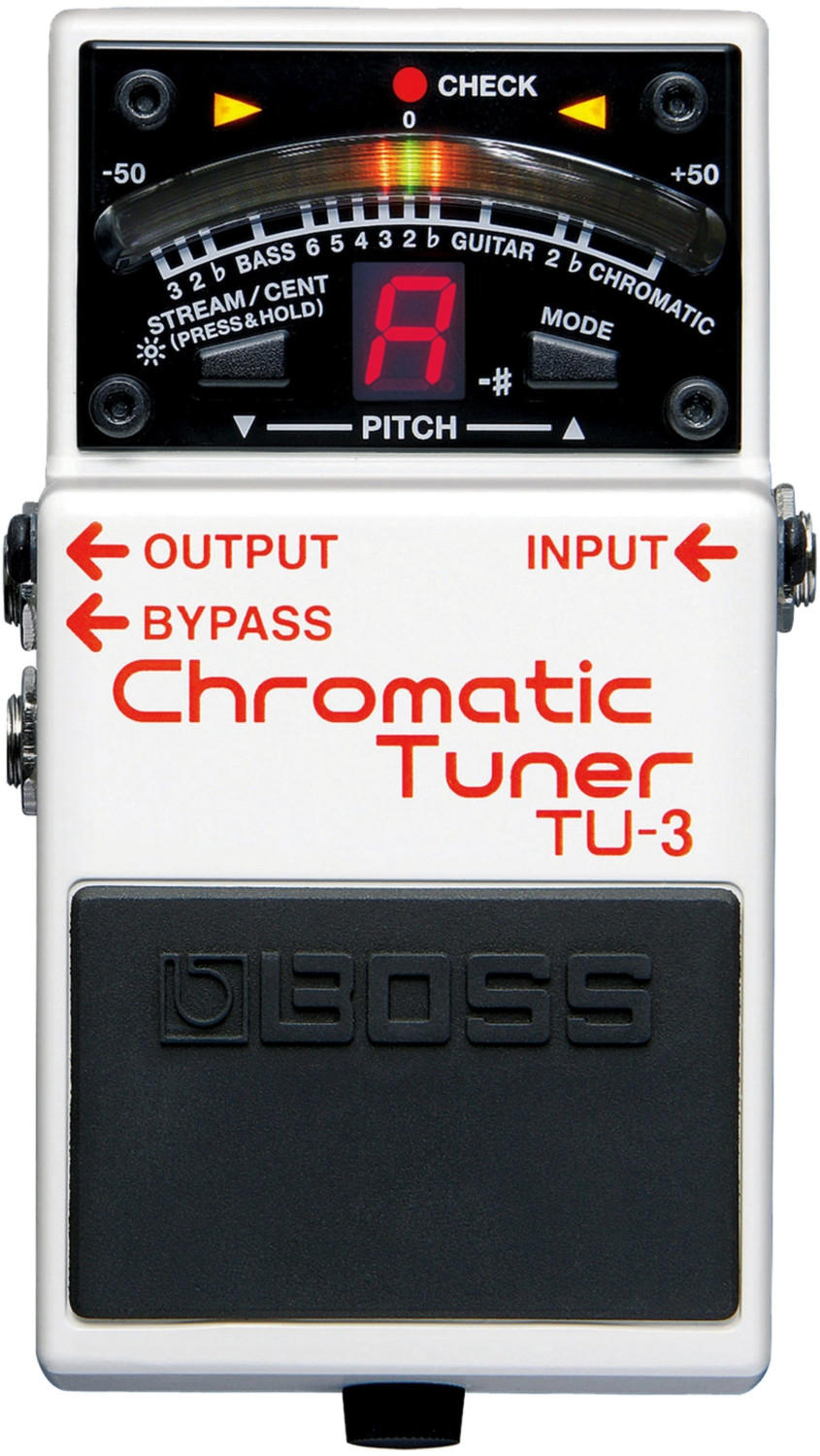
Ease of use
Look for tuners that have a clear and intuitive display, making it easy to understand and adjust the tuning. For example, the Snark SN5X Clip-On Guitar Tuner features a full-color display that rotates 360 degrees, allowing you to position it for optimal visibility. It also has a high-sensitivity vibration sensor, ensuring accurate tuning even in noisy environments.
Another option is the Korg Pitchblack Poly Pedal Tuner, which is designed with a large, easy-to-read LED display that indicates the tuning status at a glance. It offers true bypass switching to preserve the integrity of your sound, and its rugged construction makes it suitable for both studio and live performances.
For those who prefer more traditional tuning methods, handheld tuners like the Boss TU-3 Chromatic Pedal Tuner or the TC Electronic Polytune 3 Mini Pedal Tuner can be an excellent choice. These tuners have straightforward interfaces with clear indicators that help you adjust your strings with accuracy.
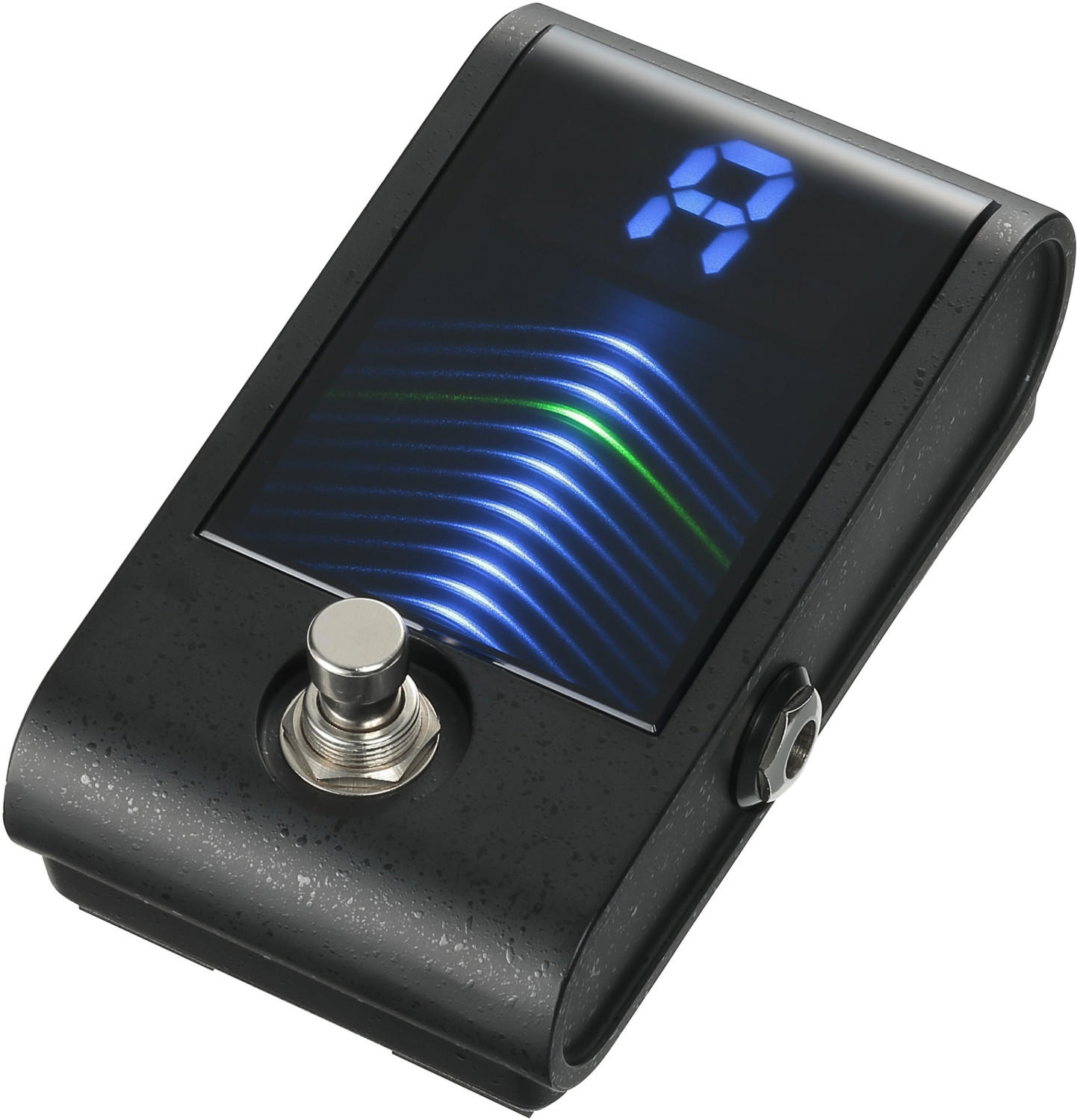

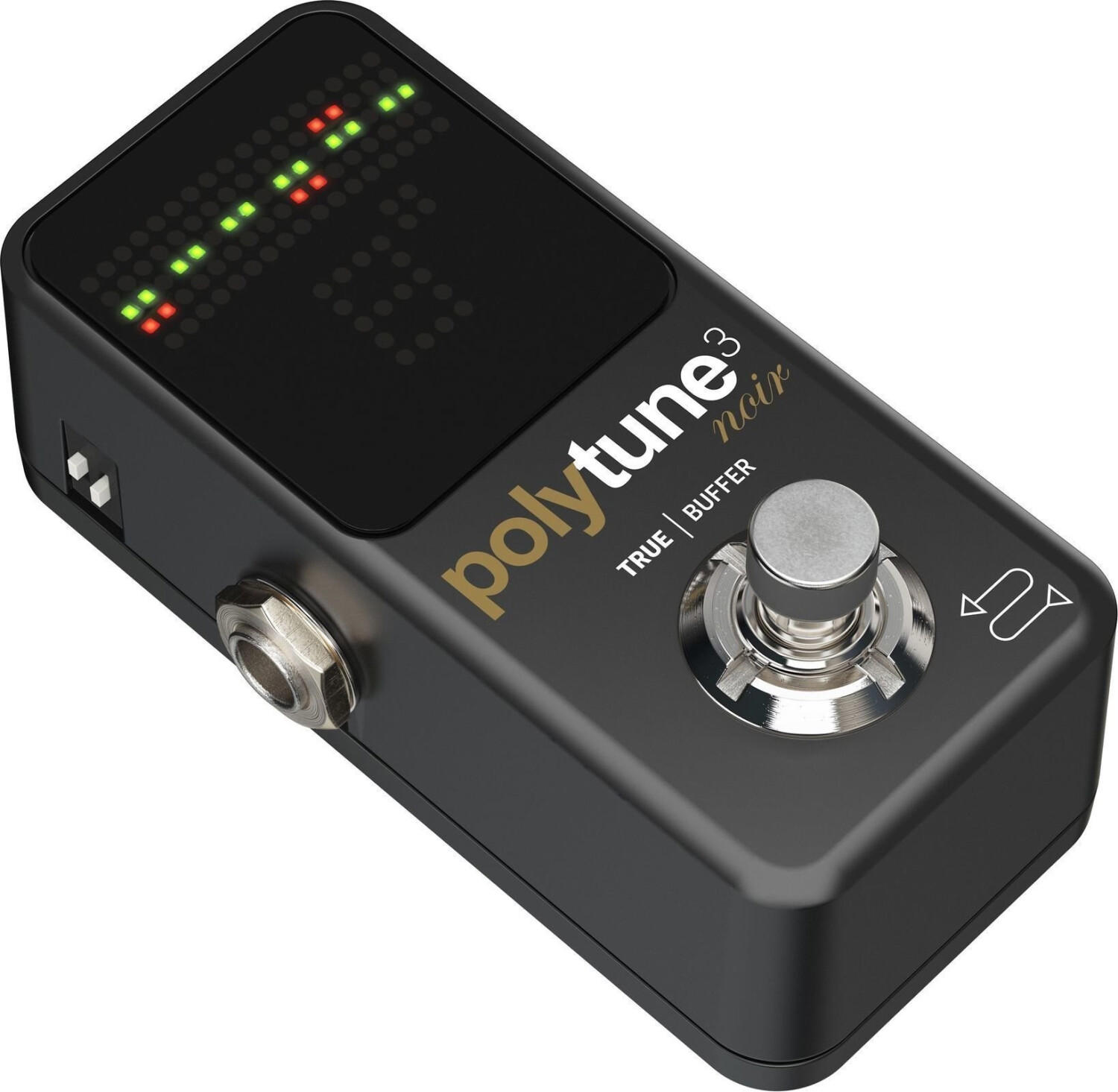
In summary, when considering ease of use in choosing a guitar tuner, look for clear and intuitive displays, user-friendly interfaces, and features that enhance visibility and accuracy.
Display type (LED, LCD, needle)
There are three common types of displays: LED, LCD, and needle. LED displays use light-emitting diodes to indicate whether a string is in tune. They are usually found on smaller, compact tuners like the KLIQ UberTuner and D'Addario NS Micro Clip-On Tuner. On the other hand, LCD displays provide a more detailed representation of pitch, often showing the note name and accuracy in cents. This type of display is commonly found on mid-range tuners such as the BOSS TU-3 Chromatic Tuner and the TC Electronic PolyTune 3. For those who prefer a more traditional approach, needle displays mimic the look and operation of analog tuners. The Peterson StroboClip HD and Snark ST-8 Super Tight Clip-On Tuner both feature needle displays, which provide a responsive visual representation of pitch. Overall, the display type you choose comes down to personal preference and the level of detail you require when tuning your guitar.
Calibration options
Calibration refers to the ability of the tuner to adjust its reference pitch to match your instrument. Some tuners offer a wide range of calibration options, allowing you to tune to different musical pitches or even non-standard tuning systems. One example of a tuner with versatile calibration options is the 'Boss TU-3 Chromatic Tuner', which offers a calibration range of 436-445 Hz. This allows you to tune your guitar to slightly lower or higher pitches than standard. Another example is the 'Snark SN5X Clip-On Tuner', which offers a calibration range of 415-466 Hz, giving you even more flexibility in tuning options. With tuners that have adjustable calibration, you have the freedom to tune your guitar precisely to your desired pitch.
Tuning modes (chromatic, guitar, bass, violin, etc.)
Different tuners have different tuning modes that cater to various instruments. Some tuners offer chromatic tuning, which enables you to tune any instrument precisely regardless of its tuning. For guitarists, it is crucial to look for a tuner that supports guitar tuning specifically. Tuners such as the Korg CA-2 and TC Electronic Polytune Clip are exceptional options that provide not only chromatic tuning but also guitar tuning.
Other musicians may require tuners with specific tuning modes for their instruments. Bassists should opt for a tuner that offers bass tuning modes like the Boss TU-3s with dedicated bass tuning capabilities. Violin players can benefit from tuners such as the Snark SN5X which comes with dedicated violin tuning modes. It is important to carefully consider the tuning modes offered by the guitar tuner you choose to ensure it caters to your instrument's specific tuning requirements.
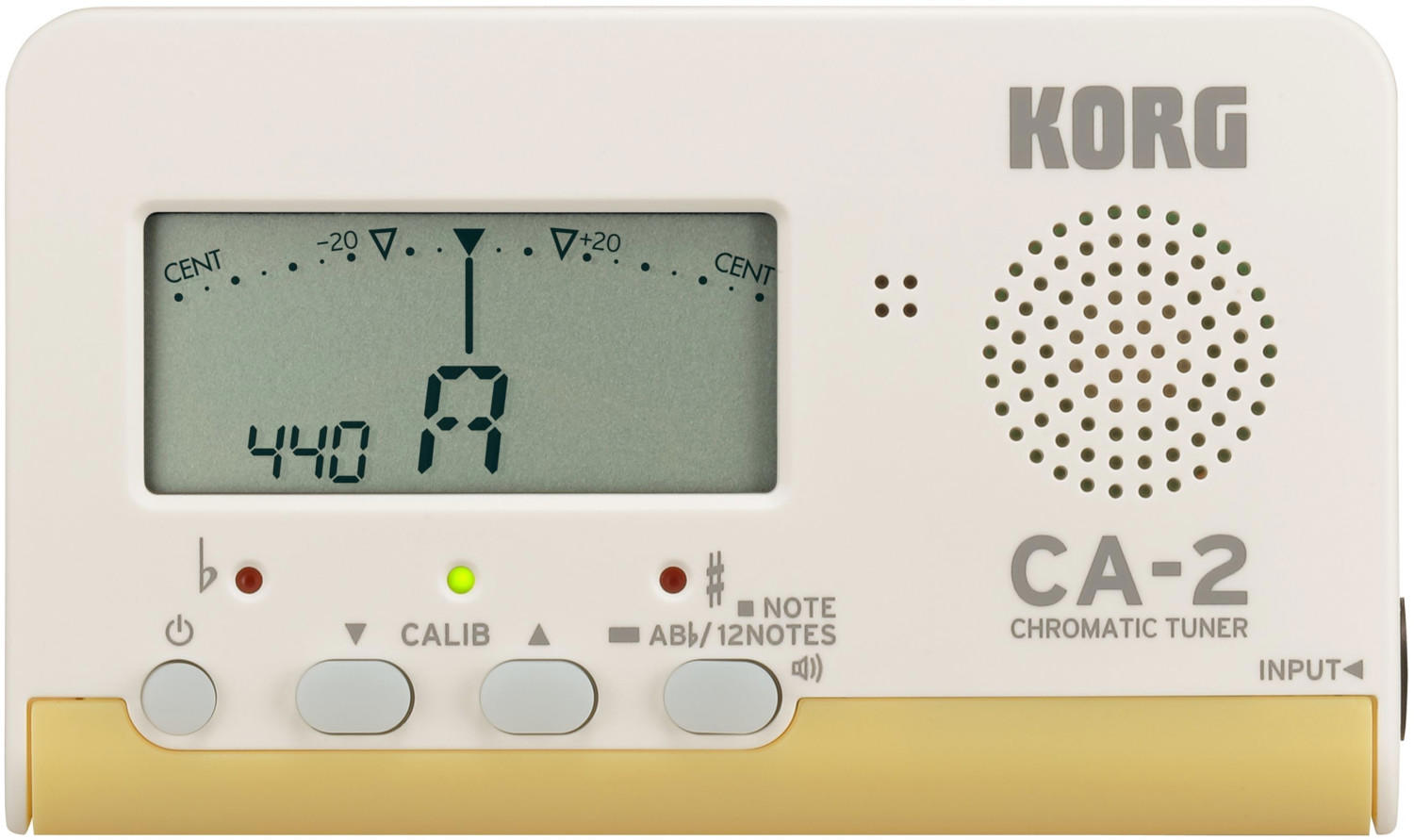
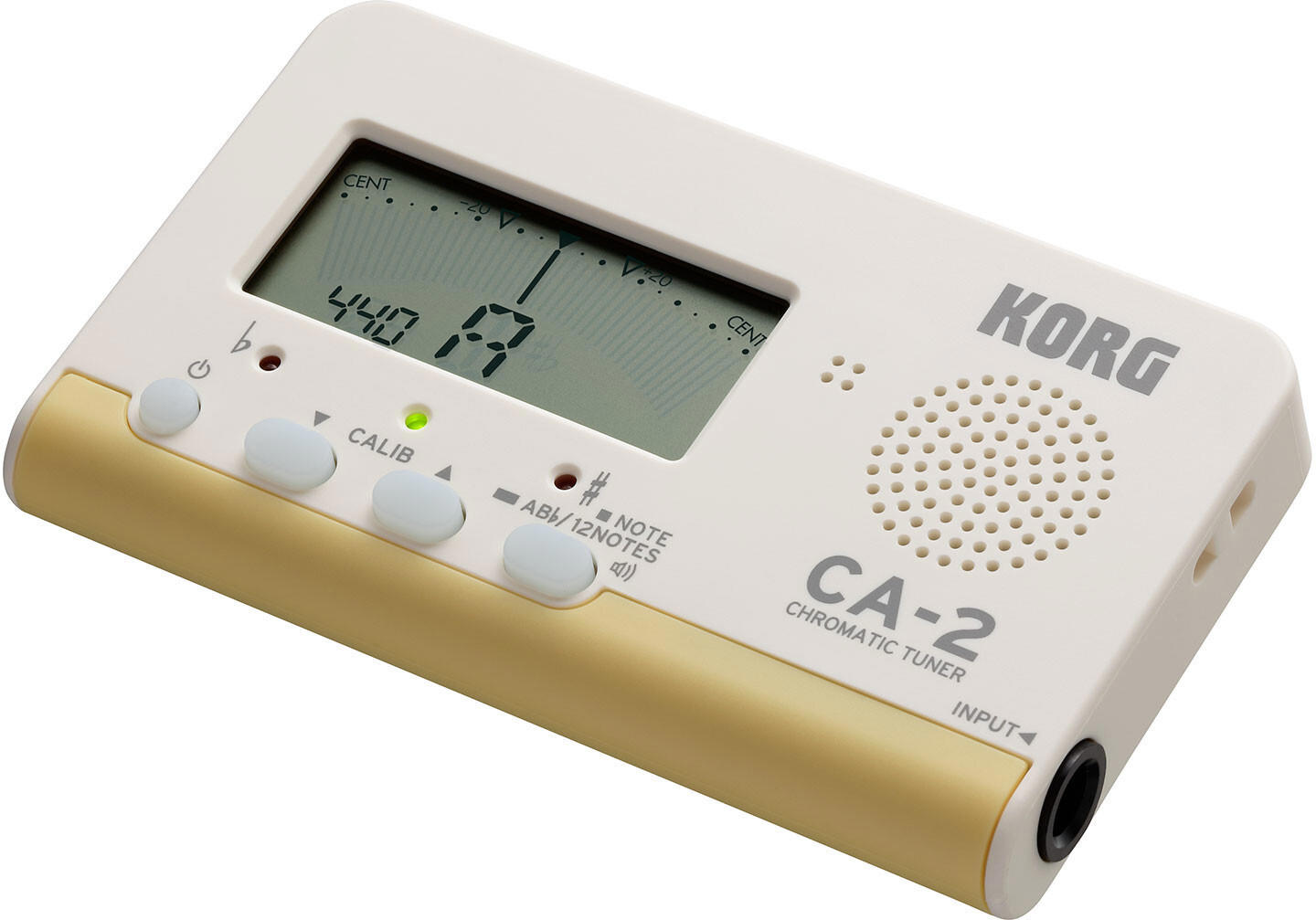
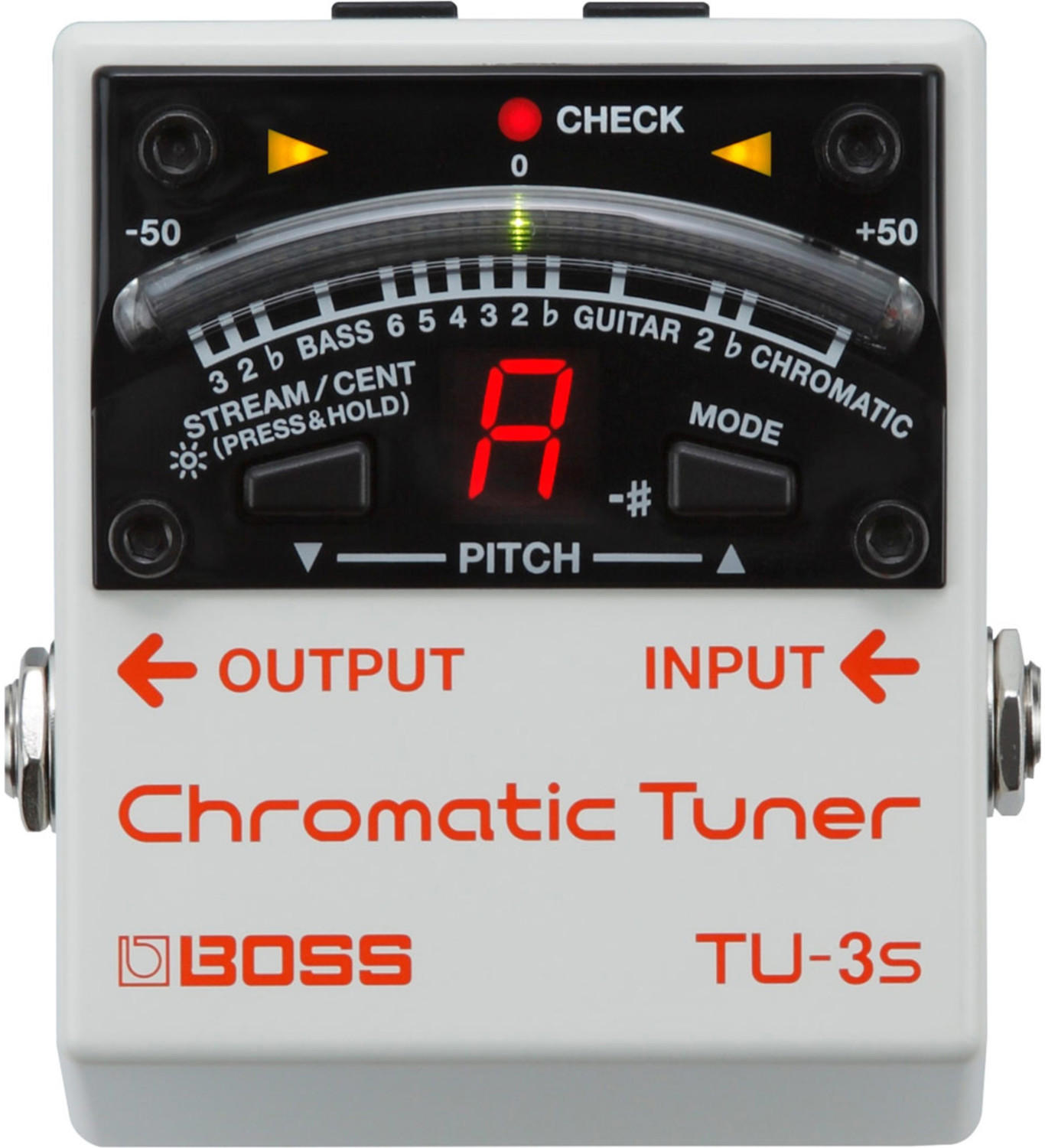
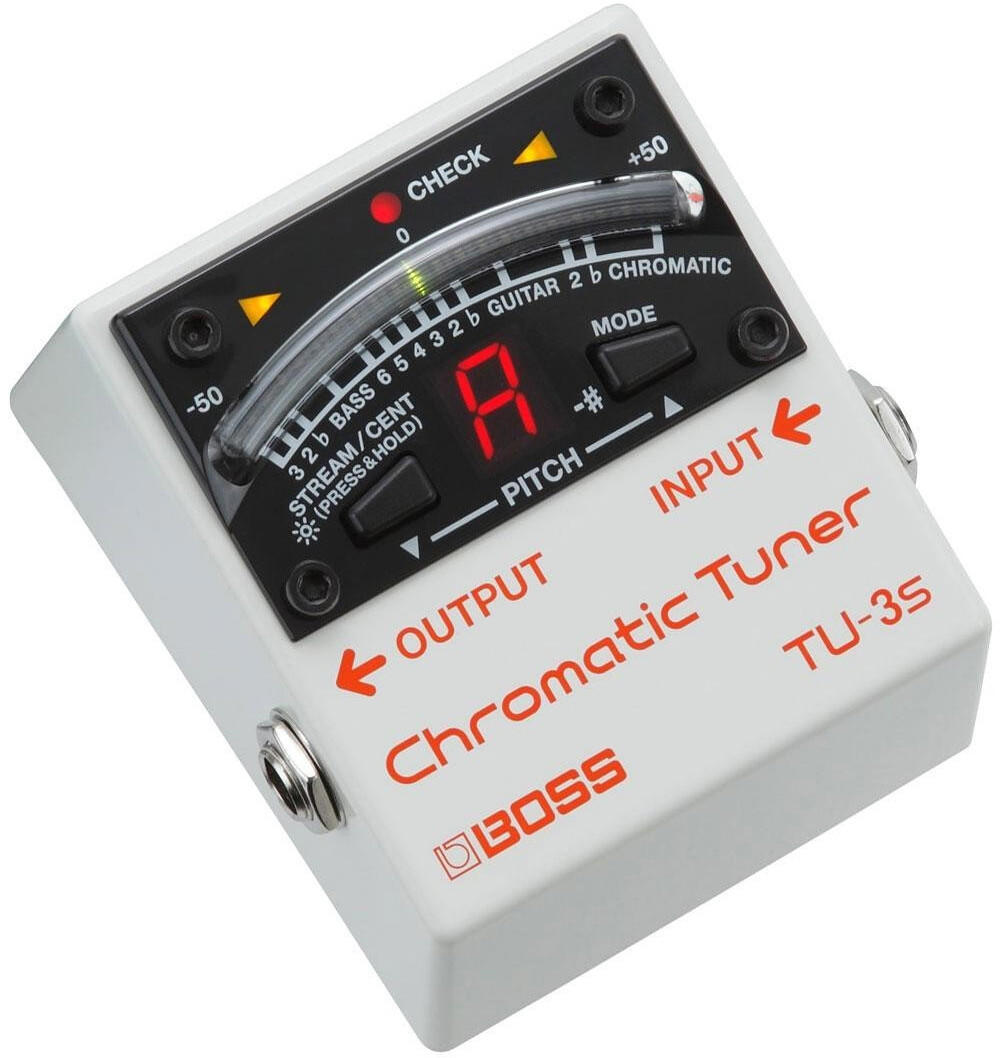
Pitch detection range
This refers to the range of frequencies that the tuner can accurately detect and tune. A wider pitch detection range allows you to tune a variety of stringed instruments, not only guitars but also basses, ukuleles, violins, and more. For example, the Korg AW-LT100G offers a broad detection range from C0 (16.35 Hz) to C8 (4,186 Hz) to accommodate various instruments. On the other hand, products like the Peterson StroboPlus HD provide an even wider pitch detection range of A0 (27.50 Hz) to C8 (4,186 Hz) for professional musicians who need precise tuning across a wide range of instruments. Remember, the pitch detection range is an essential feature to ensure that your guitar tuner is suitable for different instruments you may play.
Response time
A fast response time ensures accurate tuning without delays, allowing you to effortlessly keep your guitar in perfect tune. One great option with an impeccable response time is the 'PolyTune 3' by TC Electronic, which boasts a lightning-fast chromatic tuner that can accurately measure pitches in just 0.5 milliseconds. Another recommended choice would be the 'Boss TU-3', known for its incredibly swift response time of just 1 millisecond. These tuners guarantee quick and accurate results, providing a seamless tuning process for guitarists of all levels.
In terms of response time, tuners on the market can be divided into two main groups: strobe tuners and digital tuners. strobe tuners utilize a mechanical approach to tuning and exhibit extremely fast response times, such as the mentioned 'PolyTune 3', allowing for precise and efficient tuning. On the other hand, digital tuners implement advanced digital processing to quickly analyze the pitch, resulting in highly accurate and responsive tuning. Models like the well-regarded 'Boss TU-3' excel in this category with their rapid and reliable response. Both options ensure an efficient tuning experience, catering to different preferences and needs.


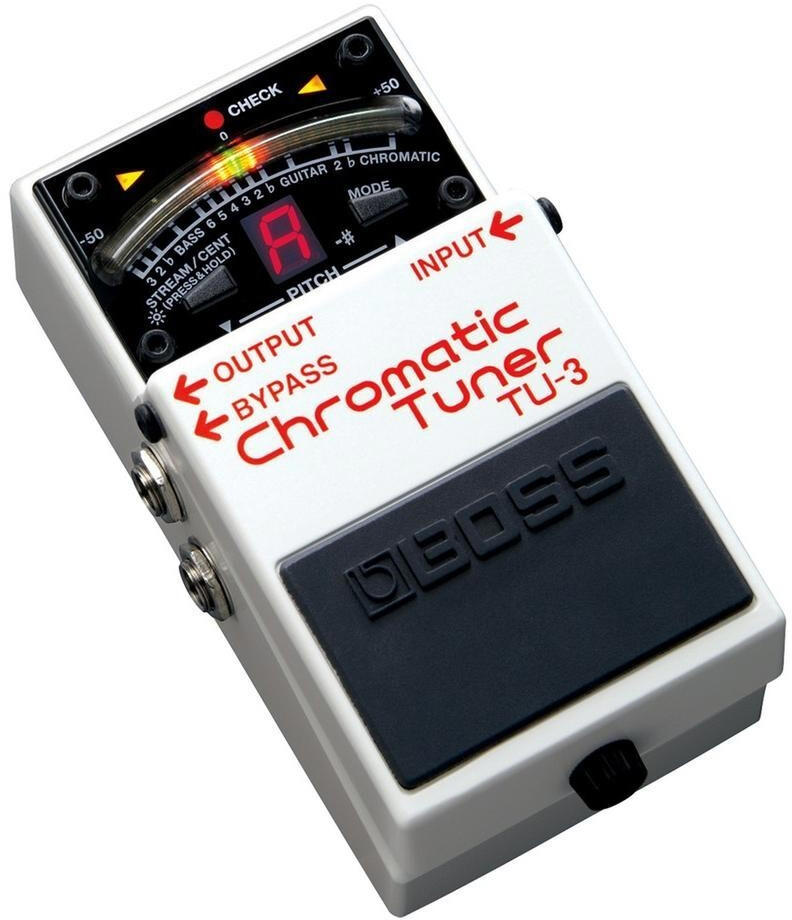
Battery life
Having a tuner with a long-lasting battery ensures that you won't have to constantly worry about it dying in the middle of a jam session or gig. Look for tuners with advanced power-saving features or ones that use efficient battery technologies. One standout product in this category is the Korg CA-40 Chromatic Tuner. It boasts a staggering battery life of approximately 85 hours when using two AAA batteries. Another excellent option is the Snark SN-8 Super Tight All Instrument Tuner. This tuner offers an extended battery life thanks to its high-sensitivity vibration sensor combined with its built-in tap tempo metronome. So whether you prefer a tuner that lasts for several weeks or one that can be used for months on end, these battery-efficient options have you covered.
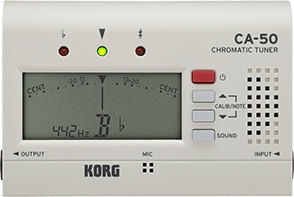
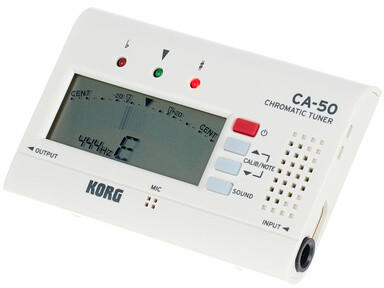
Backlight illumination options
Look for tuners with a bright and clear backlight that allows you to easily see the tuning results, even on dark stages or in poorly lit environments.
One notable product in this category is the TC Electronic Polytune 2 Mini Noir. With its high-contrast LED display and retina-scorching brightness, it ensures optimal visibility on even the darkest gig. Additionally, the display automatically adapts to the light conditions, further enhancing legibility. Another excellent option is the Peterson StroboClip HD Tune, which features an ultra-bright, multi-color display with a full 1080p resolution. Its backlight options include high visibility white, green, and blue, providing exceptional clarity regardless of the lighting conditions.

These examples represent the high-end segment of tuners with top-notch backlight illumination options. However, products in the mid-range and budget segments like the Korg Pitchblack Advance and the Snark ST-8HZ Super Tight also offer excellent backlight illumination, ensuring clear visibility during tuning.
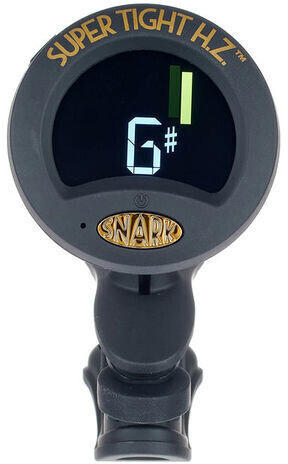
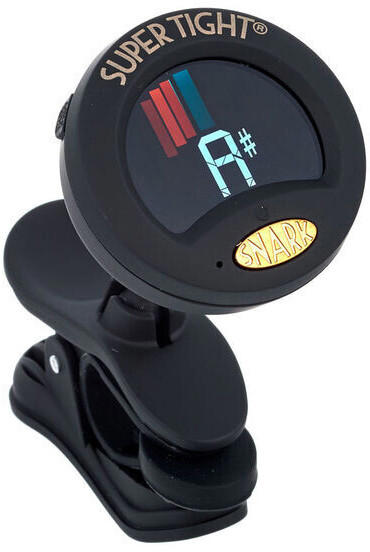
Clip on or pedal design
Clip-on tuners are compact, portable, and can be easily attached to the headstock of your guitar. They work by sensing the vibrations of the strings, providing a quick and accurate tuning. A popular clip-on tuner is the Snark SN-5X, which features a full-color display, a 360-degree swivel arm for easy visibility, and a high-sensitivity vibration sensor for accurate tuning in noisy environments. Another excellent option is the KLIQ UberTuner, known for its bright display, a robust clip that can accommodate various headstock sizes, and a calibration range from 430Hz to 450Hz for precise tuning.
On the other hand, if you prefer a more versatile solution that can be used with multiple instruments, a pedal tuner is worth considering. Pedal tuners are larger in size but offer additional functionality, such as true bypass, muting capabilities, and often have multiple outputs for routing your signal. A top-grade pedal tuner is the Boss TU-3. It boasts a large LED display with a high-brightness mode, a rugged build for durability, and support for up to seven-string guitars and six-string basses. Another option is the TC Electronic Polytune 3, which features polyphonic tuning for quick tuning of all strings simultaneously, a strobe tuner mode for enhanced precision, and a built-in Bonafide Buffer to maintain your signal integrity. Whether you opt for a clip-on or pedal design ultimately depends on your specific needs and preferences.


Automatic shut-off feature
This feature helps save battery life by automatically turning off the tuner after a period of inactivity. The Boss TU-3 Chromatic Tuner is a popular choice among guitarists, featuring an automatic shut-off that kicks in after three minutes of no signal detection. Another great option is the Korg Pitchblack Advance Guitar Tuner, which has an auto-off function that activates after 20 minutes of inactivity. Both tuners offer reliable and accurate tuning capabilities while also conserving battery power with their automatic shut-off features.
Clip strength
The clip strength refers to how well the tuner attaches and holds onto the guitar headstock. It is crucial to ensure that the tuner has a sturdy and durable clip that can hold onto the instrument securely during the tuning process.
There are various guitar tuners available on the market that offer strong clip strength. In the mid-range segment, the D'Addario NS Micro Clip-On Tuner is highly recommended. With its ultra-sensitive piezo sensor and multi-color display, this tuner provides a strong and reliable grip that won't damage the guitar finish. Another option in this segment is the Snark SN-5X Clip-On Tuner. Known for its strong clip and impressive accuracy, this tuner features a full-color display and a rotating head for ease of use.
In the higher-end segment, the Peterson StroboPlus HD Desktop Strobe Tuner is a standout choice. This tuner utilizes Peterson's patented "Virtual Strobe" technology, providing unparalleled accuracy and a solid grip with its rugged clip design. It is perfect for professional musicians and enthusiasts alike. Other options in this segment include the Korg AW-OTG Polyphonic Clip-on Tuner known for its strong grip and polyphonic tuning capability, and the T.C. Electronic PolyTune Clip-On Tuner which offers a strong clip and exceptional tuning accuracy.
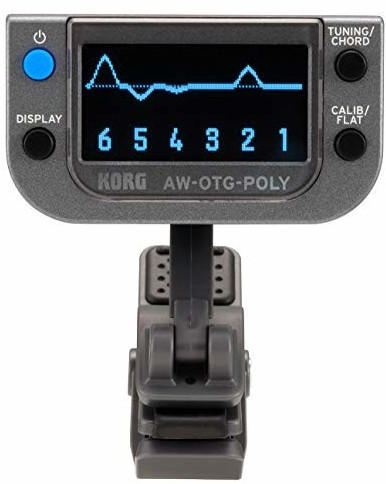
Compatibility with different instruments
Some tuners on the market are designed specifically for guitars, while others are universal and can be used with different stringed instruments such as bass guitars, ukuleles, mandolins, and violins. A great example of a tuner suitable for different instruments is the 'Boss TU-12EX'. This chromatic tuner has a wide tuning range that can cater to guitars, basses, and other stringed instruments. Another excellent option is the 'Korg AW-OTG-POLY' tuner, which can be used for guitar, bass, and various orchestral instruments. It features a clip-on design for easy attachment and accurate tuning, making it a versatile choice for musicians playing different instruments.

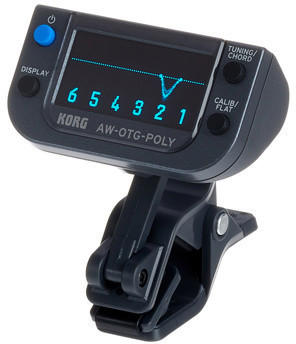
Portability
If you travel often or play gigs, having a compact tuner that you can easily take with you is crucial. There are a few great options on the market that cater to this need. One such product is the Snark SN5X Clip-On Tuner. This tuner is incredibly lightweight and attaches securely to the headstock of your guitar. It features a full-color display with a rotating swivel, making it easy to view from any angle. Another portable option to consider is the Korg Pitchclip 2+ Clip-On Tuner. This tuner is not only compact, but also offers excellent accuracy and visibility with its high-brightness LED display. Both these tuners are small enough to fit in your pocket or guitar case, ensuring that you'll always have a reliable tuner with you wherever you go.


Size
There are various sizes of guitar tuners available on the market today, ranging from compact and portable to larger and more robust models.
For those who prioritize portability, a small and compact tuner is ideal. One such example is the 'Korg Pitchclip 2', which features a compact design that can be easily clipped onto the headstock of the guitar. Another option for portability is the 'Snark SN-1X', which offers a compact footprint and a bright, easy-to-read display. These compact tuners are perfect for on-the-go musicians who value convenience.
On the other end of the spectrum, musicians who prefer a more substantial tuner may opt for a larger model, such as the 'Boss TU-3'. This tuner not only provides a large display screen but also offers additional features like power output for other pedals. The 'Peterson Strobostomp HD' is another example of a larger tuner with a high-definition screen, offering extreme precision for tuning.
The size of the guitar tuner should be chosen based on personal preferences and specific needs, whether it be for portability or enhanced functionality.
Durability
After all, a tuner should be able to withstand frequent use and travel without succumbing to wear and tear. One product that stands out in terms of durability is the TC Electronic PolyTune 3 Mini Guitar Tuner. This compact tuner boasts a rugged aluminum casing that offers excellent protection against damage, making it ideal for musicians on the go. Another durable option is the Boss TU-3 Chromatic Tuner. Its sturdy metal construction ensures long-lasting performance, and it even includes a high-brightness mode for improved visibility in various lighting conditions. In terms of durability, these tuners are suitable choices for any guitarist, guaranteeing uninterrupted tuning accuracy for years to come.

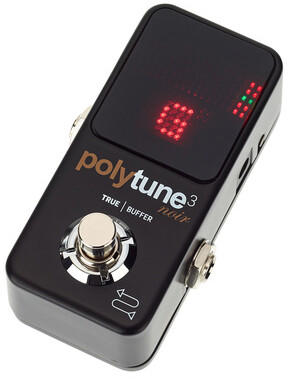
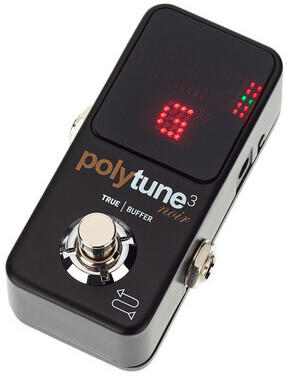
Metronome function
A built-in metronome is a great addition for the guitar tuner as it helps players develop their sense of rhythm and accuracy while practicing. The Korg TM60BK Tuner Metronome is a popular option that offers both tuning and metronome functions in one compact device. It features a wide detection range and precision calibration, allowing for accurate tuning adjustments. Another recommended product, Boss DB-90 Dr. Beat Metronome, stands out for its advanced features such as multi-function practice modes and rhythm coach functions. It provides a range of diverse rhythms and time signatures for more comprehensive practice sessions. Lastly, the Snark SN5X Clip-On Tuner combines a tuner, metronome, and tap tempo metronome function into a small clip-on design, making it convenient for on-the-go musicians. With its bright display and sensitivity, it is suitable for both acoustic and electric guitars. These products cater to different budgets and requirements, offering a variety of options for musicians looking to incorporate a metronome function into their guitar tuner.
Reference pitch options (A440, A442, etc.)
The reference pitch is the note that the tuner uses as a standard to which the guitar strings should be tuned. The most common reference pitch option is A440, which means that the tuner will tune the guitar to the standard pitch of A at a frequency of 440 Hz. Some tuners also offer other reference pitch options such as A442 or A443.
One great example of a tuner that offers multiple reference pitch options is the 'TC Electronic PolyTune 3 Mini'. This tuner not only has the A440 reference pitch option, but it also allows users to choose alternative reference pitches such as A443 or A446. Another option is the 'Korg GA-2 Guitar and Bass Tuner', which offers the A440 reference pitch as well as reference pitches ranging from A430 to A450 in 1 Hz steps. Both of these tuners are compact and accurate, making them suitable for both amateur and professional guitarists.
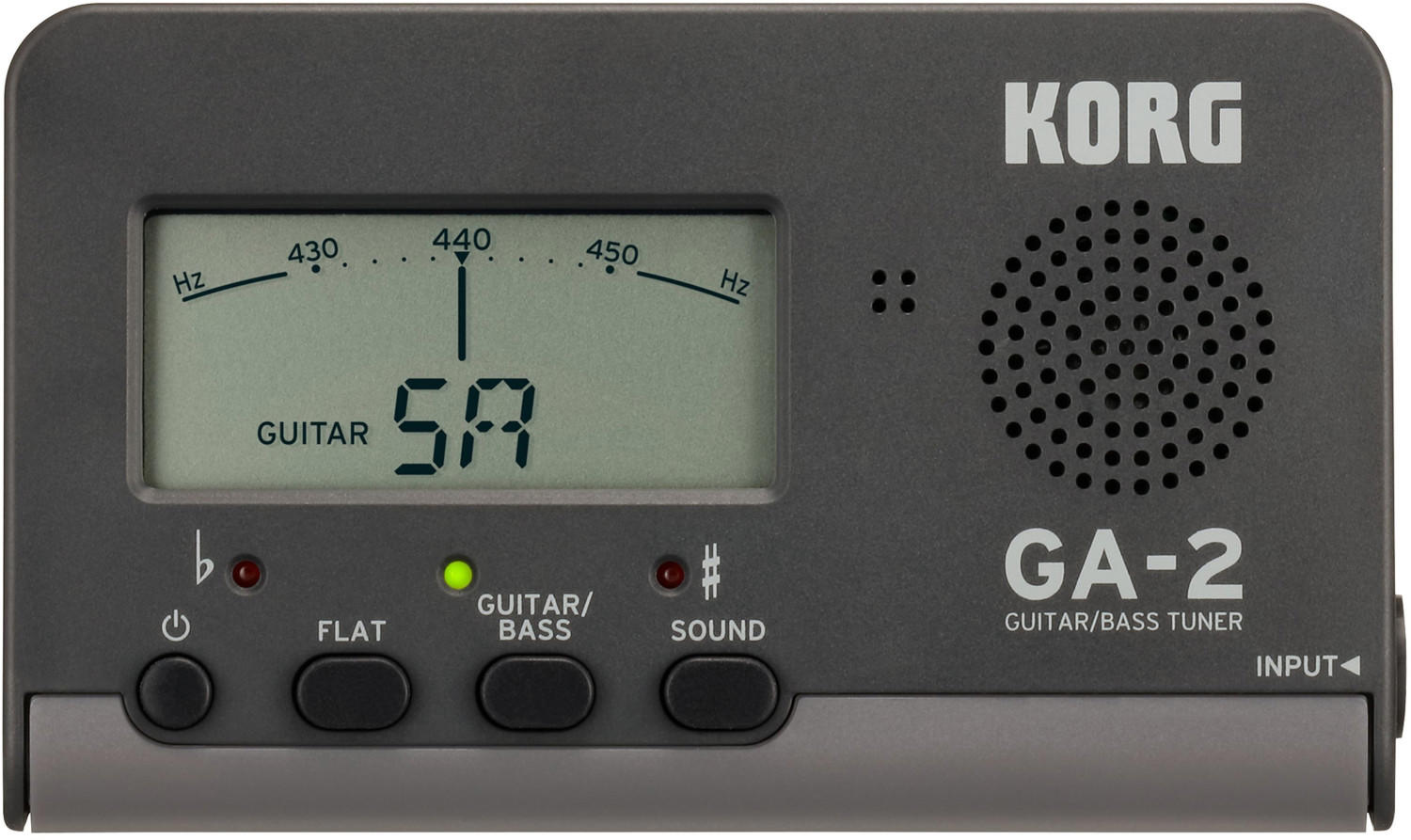
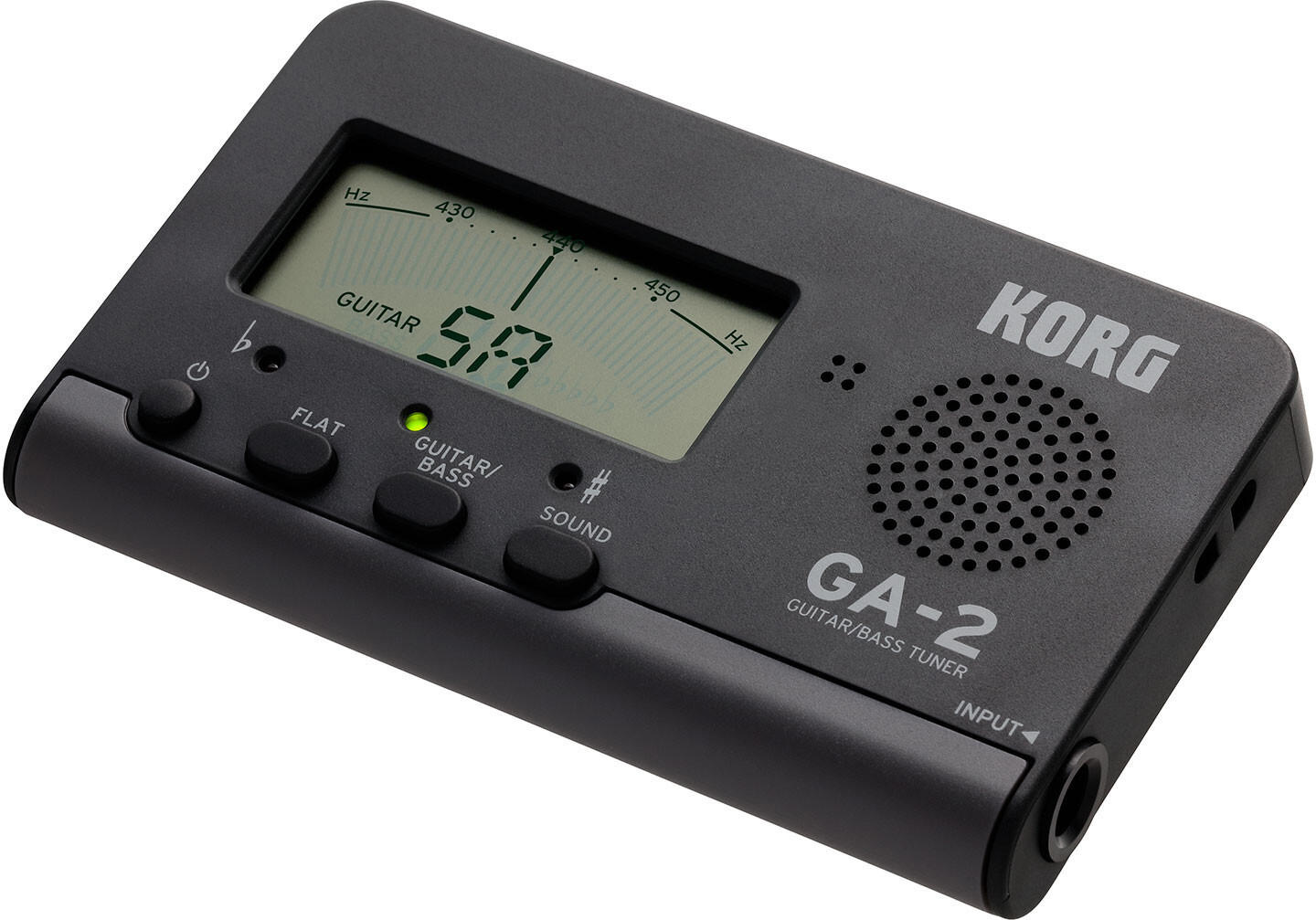
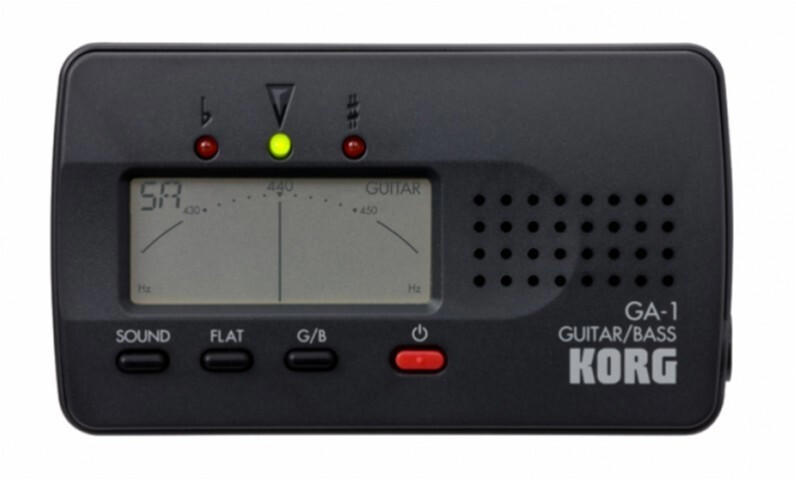
Hook or mounting mechanism (for clip-on tuners)
The way the tuner attaches to the instrument can greatly affect its convenience and accuracy. Typically, clip-on tuners feature a spring-loaded clamp that securely fastens onto the headstock of the guitar. Some tuners, like the Snark SN5X Clip-On Tuner, have a rubber grip that provides firm and scratch-free attachment, ensuring the tuner stays in place during use. Other tuners, such as the D'Addario NS Micro Clip-On Tuner, feature a multi-directional swivel clamp, allowing for effortless adjustment for optimal viewing angles. In addition, there are also compact tuners like the KLIQ UberTuner that offer a compact design and an adjustable clamp size, catering to guitars with smaller headstocks or unconventional shapes. Mounting mechanisms are an important factor to consider in ensuring that the tuner fits securely and comfortably on your instrument.
Transposition options
Transposition allows you to tune your guitar to different keys, making it an essential feature for musicians who frequently use alternate tunings or play in non-standard keys.
For those looking for a reliable and affordable option, the Korg GA-2 Guitar/Bass Tuner is a great choice. This compact tuner offers drop and flat tunings up to seven semitones below standard pitch, providing flexibility for various playing styles.
If you require more advanced transposition options, the TC Electronic PolyTune 3 Pedal Tuner is a fantastic option. It supports capo mode, ensuring accuracy when playing with a capo on your guitar. Additionally, the PolyTune 3 allows for open tuning, perfect for players who experiment with different chord shapes.



For professionals and those seeking high precision, the Peterson Strobe Tuner series would be an ideal choice. These tuners use a strobe display, providing unmatched accuracy and precision. The Peterson Strobe Tuner not only allows transposition but also offers subtle changes in cents, ensuring precise tuning even for the most demanding musicians.
Flat tuning capabilities
Flat tuning refers to the process of lowering the pitch of all the strings on a guitar by a half step or more. This is particularly useful for guitarists who play in alternate tunings or want to explore different musical genres. For those who desire a tuner specifically designed for flat tuning, the TC Electronic Polytune 3 is an excellent option. It offers a polyphonic tuning mode that allows you to simultaneously tune all strings at once, making the process of flat tuning quick and efficient. Another noteworthy choice is the Boss TU-3 Chromatic Tuner, which features a flat tuning function and provides accurate tuning for guitars even in noisy environments. It is a durable and easy-to-use tuner that ensures precise flat tuning capabilities.

Bulkiness
It is desirable to have a tuner that is compact and lightweight, ensuring optimum portability and convenience for the guitarist. Not only does a bulky tuner occupy unnecessary space in your guitar case, but it can also become cumbersome to carry around during gigs or practice sessions. An example of a compact and lightweight tuner is the 'Snark SN-5X', which weighs only 1.12 ounces and is less than 2 inches in height. Similarly, the 'Korg Pitchclip 2' is another excellent option as it weighs just 1.4 ounces and can fit easily in your gig bag or pocket. These tuners are not only sleek and compact but also offer accurate tuning and clear displays to assist with quick and convenient tuning of your guitar.
Power source (battery, rechargeable, USB)
There are several options available on the market today, including battery-powered, rechargeable, and USB-powered tuners. Battery-powered tuners, such as the Snark SN5X and Korg CA-2, are portable and convenient with a typical battery life of around 100 hours of continuous use. Rechargeable tuners, like the TC Electronic Polytune 3 and Boss TU-3S, offer the benefit of being eco-friendly and cost-effective in the long run. These tuners can be easily charged using a USB cable and have the advantage of displaying battery life indicators. USB-powered tuners, such as the Planet Waves PW-CT and Fender FCT-2, eliminate the need for batteries or power cords altogether, making them ideal for practicing at home or in the studio. With their flexible power options, it's crucial to find a tuner that suits your needs and preference.


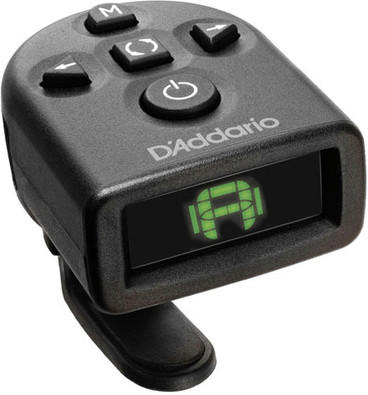
Additional features (tone generator, calibration memory)
A tone generator produces reference pitches to help tune your guitar. This can be especially helpful for beginners who may struggle to match the correct pitch by ear. One example of a tuner with a built-in tone generator is the Boss TU-3 Chromatic Tuner. This tuner not only has a wide tuning range and high visibility display, but also offers a C1 to B6 range for the tone generator. This allows you to accurately tune each string to its proper pitch.
Another important feature to look for is calibration memory. Calibration memory allows you to save specific reference pitches, ensuring compatibility with various instruments and tunings. The Korg Pitchblack Advance PB-AD Pitchblack Advance Chromatic Tuner is a great option with this feature. It offers four types of calibration options (436-445 Hz) and is capable of preserving your calibration settings, making it convenient for teaching or switch between different tunings. This tuner also has LED meters that provide excellent visibility, even in dark settings.
Noise filtering capabilities
This feature allows the tuner to accurately detect the pitch of the strings amidst any surrounding background noise. The PolyTune 3 Mini Chromatic Tuner is a great option that boasts exceptional noise filtering capabilities. With its polyphonic tuning mode, it can quickly and accurately detect the tuning of all strings simultaneously, making it ideal for players who like to strum and tune quickly. Another option to consider is the Boss TU-3 Chromatic Tuner which features a high brightness mode for easy visibility on stage, and its ability to filter out unwanted noise ensures precise tuning in any live setting.
Range of supported instrument tones
This refers to the different frequencies that the tuner can detect and accurately tune. For example, the 'Snark ST-8HZ Super Tight Clip-On Tuner' supports a wide range of instrument tones, from A0 (27.5 Hz) to C8 (4186 Hz). It covers virtually all types of instruments such as guitar, bass, ukulele, violin, and even wind instruments. Another versatile option is the 'Boss TU-3 Chromatic Tuner', which features a tuning range of C0 (16.35 Hz) to C8 (4186 Hz). Whether you play in different tunings or own multiple instruments, these tuners offer a wide range of supported tones to ensure accurate tuning.


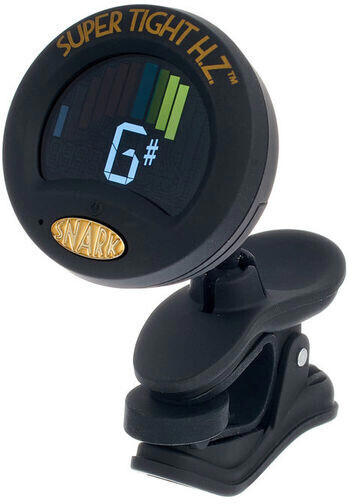
Finger-friendly button design
This ensures that the tuner is easy to use and doesn't cause any discomfort during tuning. Some tuners on the market have incorporated ergonomically designed buttons that are smooth and easy to press, providing a hassle-free tuning experience.
One example of a tuner with a finger-friendly button design is the 'TC Electronic PolyTune 3'. It features a miniaturized LED display with multiple colors that helps visualize the strings' pitch. The buttons are flat, soft, and offer a responsive touch that is comfortable to use. Another great option is the 'Korg Pitchblack Advance', which boasts large LED meters and easy-to-press buttons that ensure absolute tuning accuracy without any strain on your fingers. Both these tuners provide an excellent finger-friendly button design, making them ideal choices for guitar players seeking comfort and ease of use when tuning their instruments.
Visibility in different lighting conditions
Whether you are performing on a brightly lit stage or in a dimly lit rehearsal room, having a tuner that is easily readable is crucial. Some tuners feature high-resolution, color LCD displays that provide excellent visibility in any lighting situation. One great example is the 'TC Electronic Polytune 3 Pedal Tuner' which offers a bright and easily readable display, even in direct sunlight. Another option is the 'Korg Pitchblack Advance Pedal Tuner' which boasts a large 3D-effect visual meter that is easily viewable from any angle, ensuring clear visibility even under dim lighting conditions.
In terms of groups or segments of guitar tuners, certain clip-on tuners cater specifically to different lighting conditions. For example, the 'Snark ST-8HZ Super Tight All-instrument Tuner' features a high-definition display, complete with a backlight, allowing for easy visibility in low light settings. On the other hand, the 'Peterson StroboClip HD High Definition Clip-On Tuner' uses a high-definition, backlit display that is easily visible in even the brightest environments. These are just a few examples of tuners that excel in visibility across various lighting conditions, making them great options when considering which tuner to choose.

Temperature range for reliable operation
Different tuners can have diverse temperature tolerances, and it is crucial to find one that is suitable for your needs. For example, the 'Korg Pitchblack Advance' tuner has a wide temperature range of -10 to 50 degrees Celsius, making it suitable for use in various environments. Another option to consider is the 'TC Electronic PolyTune 3' tuner, which also boasts a wide temperature operating range and can easily withstand both hot and cold conditions. In terms of affordability, there are also options like the 'Snark SN5X Clip-On Tuner', which is known for its accuracy and reliability even in extreme temperatures. These tuners, along with many others on the market, offer specific temperature ranges for reliable operation, ensuring that you can tune your guitar with precision regardless of the surrounding conditions.
Intuitive display layout
An intuitive display should provide clear and easy-to-read information that helps you tune your guitar accurately. One example of a tuner with an intuitive display is the BOSS TU-3 Chromatic Tuner. It features a high-resolution LED meter that provides precise and immediate feedback on pitch deviation, making it easy to fine-tune your instrument. Similarly, the Korg Pitchblack Programmable Pedal Tuner offers a large, bright display with a high visibility color LED that allows for seamless tuning in any lighting condition. These tuners are excellent options for musicians seeking an intuitive display layout to ensure they accurately tune their guitars.

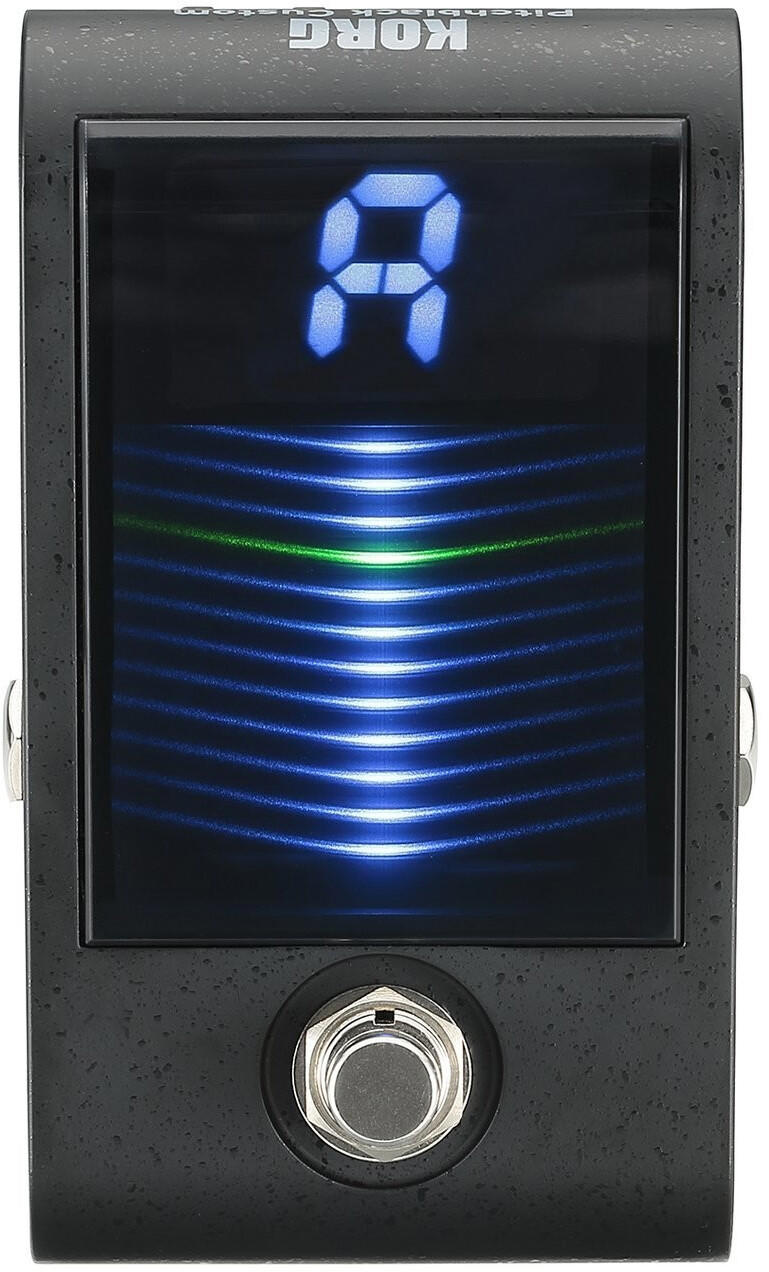
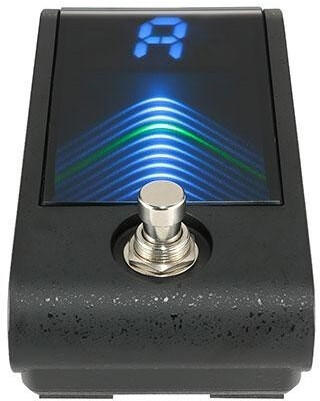
Mounting options (suction cup, magnet, etc.)
Mounting options vary, and they can greatly impact how the tuner functions and the convenience it offers. For example, some tuners come with a suction cup mounting option, allowing you to easily attach the tuner to the headstock of your guitar. The KLIQ MetroPitch is a great example of a tuner that features a suction cup mount. It offers a 3-in-1 functionality, serving as a tuner, metronome, and tone generator. The suction cup allows for quick and secure attachment without the need for any additional tools. Another option for mounting is a magnet, which can have a powerful hold and ensure stability. The Snark SN5X is a popular tuners with a magnet mount, making it easy to attach to any metal part of your guitar, ensuring it stays in place during your playing sessions.
Alternation between manual and automatic modes
This feature allows you to switch between tuning your guitar manually or using the tuner's automatic mode. In manual mode, you can tune each string by ear and rely on your own understanding of pitch and tuning accuracy. On the other hand, automatic mode uses a built-in microphone or pickup to detect the pitch of each string and display it on the tuner's screen. It makes the tuning process quicker and more precise, especially for beginners or those who struggle with hearing pitch accurately. Some tuners even offer both modes simultaneously, providing the flexibility to choose whichever method works best for you.
A great example of a tuner with this feature is the 'Boss TU-3' Chromatic Tuner. It offers both manual and automatic modes and is known for its accuracy and durability. Another option is the renowned 'Korg Pitchblack PB-AD' Advanced Pedal Tuner, which allows you to switch between manual and automatic modes with ease.


Price
There are a variety of options available on the market, ranging from budget-friendly options to more premium choices. Some affordable tuners to consider are the Snark SN-5X clip-on tuner and the KLIQ UberTuner, both priced at under $20. These tuners are compact and reliable, featuring clip-on designs that easily attach to your instrument. On the slightly higher end, the TC Electronic Polytune 3 offers a more advanced feature set, including polyphonic tuning capabilities and an easy-to-read display, making it a popular choice for players who want more options. For those seeking a professional-grade tuner, the Peterson StroboStomp HD is a top contender. Known for its high accuracy and calibration settings, this pedal tuner offers premium quality at a higher price point. Ultimately, selecting a tuner that meets your budget while still providing accurate tuning functionality is essential in making a confident choice.

Variety of brands
Different brands offer different features, reliability, and overall quality. Some well-known brands in the guitar tuner industry include Korg, BOSS, and Peterson.
Korg is recognized for its reliability and accuracy. For example, the Korg Pitchclip 2+ offers a bright and easy-to-read display, making it convenient for live performances. BOSS is another reputable brand, known for its durable construction and user-friendly interface. An excellent option is the BOSS TU-3, which provides various tuning modes, including chromatic, guitar, bass, and drop-tuning. Peterson, a brand known for its precise tuning, offers options like the Peterson StroboPlus HD, which uses a strobe display for highly accurate tuning down to 0.1 cents.
In terms of variety, guitar tuners can be categorized into clip-on tuners, pedal tuners, and rack-mounted tuners. Clip-on tuners, such as the Snark ST-2, provide convenience for acoustic and electric guitar players by attaching directly to the instrument. Pedal tuners, like the TC Electronic Polytune 3, are more suitable for electric guitarists who prefer using pedals for tuning during performances. Rack-mounted tuners, such as the Korg Pitchblack Pro, are designed for studio setups or professional touring musicians who need precise tuning in a rack-mountable format.
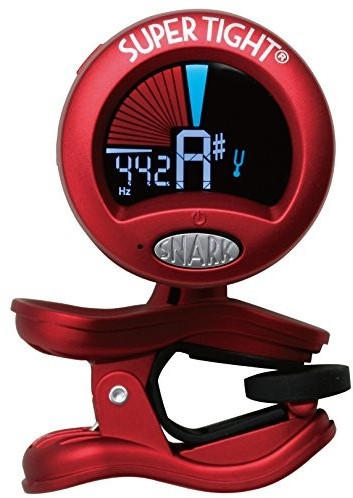

Consider your specific needs, preferences, and budget when choosing from various brands and types of guitar tuners. Keep in mind that the accuracy, display quality, ease of use, and durability are essential factors to consider as well.